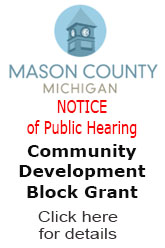
Jim Bond
#ShakenNotStirred.
Shaken, Not Stirred. A blog by Jim Bond.
Sponsored by Pro-Master Carpet Cleaning, 231-757-9061, promastercarpetcleaning.com.
We all remember what we were doing at the moment; just like the JFK assassination.
I was in St. Louis, tending to my aging stepfather. It was a trip I made from Michigan every few weeks since my mother had died three years before.
As was usually the case after the eight-plus hour drive, I had slept in. As I came down the stairs from my childhood bedroom, I noticed my stepfather in his usual position, sitting on the couch with a Camel cigarette and a cup of coffee. There were several butts in the ashtray in front of him. It was slightly before 8 am, Central Time.
Absent was his usual greeting. He looked at me with a stoic stare and told me that an airplane had flown into the World Trade Center. I don’t think I responded. I just went to the kitchen, poured a cup of coffee, returned to the living room and lit my own cigarette.
We didn’t talk much at that point, just engaged in an activity called ‘CNN Syndrome’ a phrase coined during the first Gulf War; mouths agape in wonder. We sat. We stared at the TV.
Shortly after 8 a.m., Central Time, the South Tower was hit by another plane, removing all doubt that these crashes were an accident.
Funny what creeps into one’s mind in crisis. While thousands were losing their lives in this horrific attack, the worst in 60 years, my mind went back to a dinner I had shared with friends some 13 years before, at Windows On The World, a restaurant atop the North Tower.
Having always been a little leery of heights, my imagination took me to that time as I recalled the concern I had at the time, 1,300 feet from the ground. Thankfully, my party and I weren’t close to windows.
Then the reality of the horror set in. There were people in those buildings, people who watched in abject terror as they witnessed a passenger jet coming toward them. What were their last thoughts? Had they kissed their spouse and children upon leaving earlier that morning? Had there been an argument? Were their last thoughts about God? Did they cling onto some completely bizarre thread of hope for their survival?
Slightly after 8:30 am, Central Time, the Pentagon was hit. At about 9 a.m., Central Time, the South Tower collapsed. Soon after, a high-jacked plane crashed in Somerset, Pennsylvania, killing all aboard. Soon after that the North Tower collapsed.
By this time, alarm coursed through everyone living in this country. I commiserated with the people in the South Tower at the point they realized their fate. With my wife and small children almost 600 miles away, I felt the same abject terror they must have felt. Would St. Louis, home of McDonnell Douglas, be hit? If Detroit or Chicago were attacked, would it be of enough severity to harm my family in northern Michigan?
I called home.
For hours we watched. We saw the evacuation of lower Manhattan, more than 1 million residents, workers and tourists. We witnessed the futile search for survivors at the WTC site. We sat hunched over, my stepfather and I, as President Bush announced that U.S. military forces were on high alert worldwide. The news reported that missile destroyers had been dispatched to New York and Washington, D.C.
I probably called home a few times that day; I frankly don’t recall. I do remember going to the local grocery store to stockpile food for my stepfather, spending hundreds and hundreds of dollars on frozen foods, not even considering that if electrical service were interrupted by an attack on St. Louis, it would all be for naught. I filled his car with gas, I filled my car with gas, experiencing waiting lines of cars not encountered since the gas crisis of the 1970s. While in those lines, people talked to each other. Complete strangers actually conversed. Speculated. Salved each others’ nerves. We wanted to help each other through this national catastrophe.
But the concern for others extended far beyond the Shell station at Hanley and Delmar in St. Louis. Gander, Newfoundland, a community of 10,000 souls played emergency host to thousands of travelers when all flights into the US were blocked. For two days, Newfoundlanders fed, housed and comforted complete strangers from all over the world whose travels had been curtailed due to an international emergency.
Of course, in the years since, our friends in Congress have largely denied benefits to victim’s families, to first responders and their families. They have, for the most part, ignored the needs, the sacrifices of the heroes, and families of heroes.
Why should it take a national crisis for us to listen to each other, to care, and try to understand and help each other?
So today, to honor the tragedy we remember, care for someone. Hold a door open. Smile and say hello to a stranger. If you’re able to do so, buy someone’s coffee in line at the local fast-food restaurant. For today, let’s forget politics and differences. Let’s just appreciate what we have.

















.jpg)























 (1).gif)












.png)






